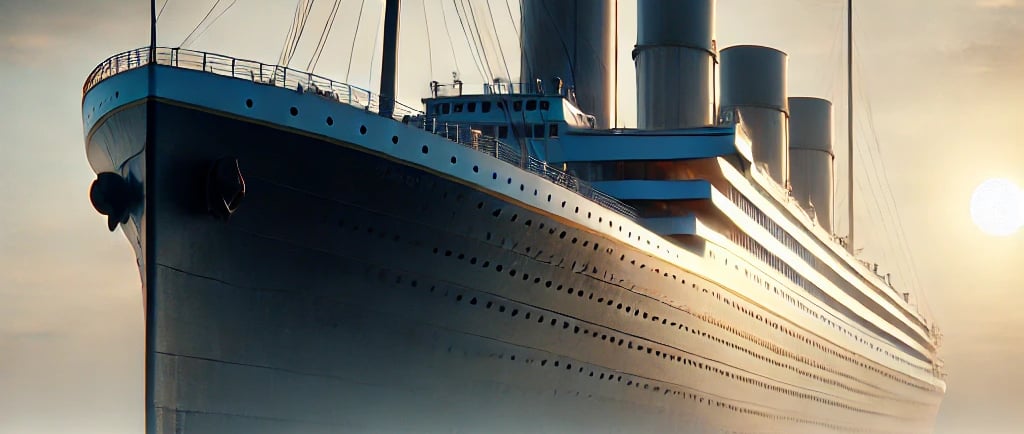Titanic: A Tragic Symphony of Fate and Numbers
Conspiracies Surrounding a Maritime Tragedy
Resti Talia Ramadhan
10/12/20243 min read


The sinking of the RMS Titanic is one of the most memorable disasters in modern history, not only for the tragic loss of life but also for the myriad conspiracy theories it has spawned. Among these theories, one of the most intriguing involves the numerology of the ship's name and its launch date, suggesting a predestined doom influenced by powerful figures such as J.P. Morgan and possibly other members of the global elite. This theory posits that the selection of the ship’s name and its launch date—both associated with the number 4, a number traditionally linked with death in several cultures—were intentional to ensure the vessel's tragic fate.
The Significance of Number 4
In numerology, the number 4 is often associated with bad luck, particularly in East Asian cultures where it is considered inauspicious because it sounds like the word for "death." Proponents of the Titanic conspiracy theory believe that the ship's fate was sealed by its associations with this number:
Name: Titanic - When you assign numbers to each letter (A=1, B=2, ..., Z=26) and sum them up, Titanic translates numerologically to 4 (T=2, I=9, T=2, A=1, N=5, I=9, C=3, which totals to 31, and 3+1=4).
Launch Date: May 31, 1911 - Adding up the digits of the launch date (3+1+0+5+1+9+1+1) also leads to 22, and further reducing 2+2 equals 4.
The repeated appearance of the number 4 in the context of the Titanic has been interpreted by some as more than mere coincidence, suggesting it was a deliberate choice to doom the ship, potentially for financial or political gain.
J.P. Morgan’s Involvement
J.P. Morgan, the financier behind the White Star Line, which owned the Titanic, is often central to these conspiracy theories. Notably, Morgan was scheduled to sail on the Titanic but canceled his trip shortly before the departure:
Cancellation Reason - Officially, Morgan canceled due to business reasons and because he was reportedly enjoying a spa in France. This last-minute change of plans has fueled speculation that he had foreknowledge of the disaster.
Implications - Morgan’s cancellation, combined with his financial interests in the ship and its insurance, has led to theories that he could have orchestrated the disaster to eliminate rivals and claim insurance money. However, these claims remain speculative and are not supported by historical evidence.
Astrological Considerations
The theory extends beyond numerology into astrology, with proponents analyzing the celestial alignments on the day of the Titanic’s launch. They argue that the astrological conditions were ominously unfavorable, further suggesting that the launch date was carefully chosen for its disastrous potential.
Sun in Taurus - Symbolizing both the grounding and material focus, some might interpret this as a sign of the Titanic’s physical grandeur and the disastrous material loss it was doomed to suffer.
Moon in Capricorn - Often associated with challenges and lessons in pragmatism, which could be seen as an astrological predictor of the practical failures the Titanic would encounter.
The Role of the Elite
The conspiracy theory broadly suggests that the Titanic was used as a vehicle by the elite to consolidate power and wealth, by removing business adversaries who perished on the ship and cashing in on insurance policies. This theory taps into broader narratives about the power of the elite and their influence over global events, viewed through the lens of numerology and astrology to suggest intentional disaster.
Historical and Cultural Impact
The Titanic disaster remains a potent symbol of human hubris and the limits of technology. The fascination with its numerological and astrological significance speaks to a broader human tendency to seek patterns and meaning in tragedy, reflecting our collective desire to make sense of random events and our fascination with the hidden machinations of power.
While there is no concrete evidence to support the idea that the Titanic was doomed by numerology, astrology, or a conspiracy among the elite, these theories persist as part of the cultural mythology surrounding the ship. They serve as a narrative through which people discuss and digest the complexities of fate, coincidence, and human agency. As such, the story of the Titanic continues to captivate imaginations, not only as a historical event but as a tale rich with mystery, intrigue, and speculation.
The story of the Titanic is a testament to the lasting allure of unsolved mysteries and the stories we construct around them to bring order to chaos and randomness. Whether viewed through the lens of historical fact or speculative theory, the Titanic remains a profound symbol of catastrophe and a pivotal moment in maritime history.
